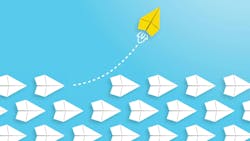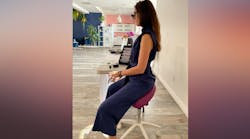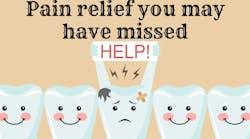Making an impact outside the op—in sales
In clinical dental hygiene, my days were dedicated to nurturing smiles and ensuring oral wellness. I assume that for most people in health care, altruism and a caring nature go hand in hand. I loved helping people and I loved the detail-oriented nature of dental hygiene. But what happens when burnout creeps in, your body rejects your career, and the pain and exhaustion are too much?
Like many people, I started researching my next move. I suffered from back pain from an early age and was prescribed muscle relaxers as early as a teen. Maybe this career wasn’t the best choice for me and my body. Maybe there was something else … but what? Who would want to hire someone with only an associate degree? What would be a rewarding career where I could still help others? As I searched online, I found my questions echoed those of others. Here is a sampling of comments I found in dental hygienist social media groups:
“I’ve only ever been an RDH. I don’t know anything else and don’t have any related work experience.”
“I can’t get a different job. I only have an associate’s degree. All jobs with comparable pay require a bachelor’s degree. I’m stuck.”
I was not alone, and my research for a change consistently led me to teaching and sales. Teaching required a bachelor’s degree and came with a pay cut. The sales jobs that were listed were the same, but I never really saw myself in sales. For a while I felt hopeless.
My pain grew to the point where I spent my weekends in bed. I thought I’d done everything to prevent this—physical therapy, chiropractic care, ergonomic training, massage therapy, and regular exercise. Yet here I was, recently diagnosed with degenerative disc disease at age 33 after nine years of clinical hygiene, and I now know why I was at that point.
Taking bold moves
I want to say that pursuing change is possible, even if it doesn’t seem feasible, and that there are ways to help people outside the op. The first step to making a change is to simply understand yourself. Fear was at the root of every negative reason I told myself I couldn’t do this. This is simply human nature.
Experiment-based research from University of Pennsylvania Wharton concluded that people tend to avoid change.1 Status quo bias is the preference for maintaining one’s current situation and opposing actions that may change your current state of affairs. In Wharton’s experiments, when people were given the choice between maintaining the status quo and a new option, their tendency was to stick with what they knew. More research indicates that risk aversion and loss aversion are helpful in understanding our emotions behind change.2
Another statistic relates to women versus men in job search habits. According to Harvard Business Review, “Women are 16% less likely to apply for a job after viewing it, and also apply to 20% fewer jobs than men.” The reason is that women will avoid applying for a job if they don’t meet 100% of the criteria, whereas men will apply if they reach at least 60% of the qualifications.3
I realized it’s not simply my lack of experience or education. So, I started putting myself out there. When I thought about things from this perspective and began self-reflecting, I realized that clinical hygiene gives us a mountain of experience that’s relevant outside the op.
Some skills employers look for regardless of the job include time management, communication skills, critical thinking and problem solving, teamwork, and emotional intelligence.4 Dental hygienists are experts in these areas. We problem solve and critical think daily as we develop recommendations and treatment plans for our patients. We develop strong relationships with patients. From an emotional intelligence perspective, we must be chameleons to the emotions of our patients. We laugh and sometimes cry with them, we comfort, and we care.
How I moved on
I started developing my resumé as such. This gave me a starting point and then I tailored it to the jobs I applied for. In the meantime, I needed to take care of myself clinically. I saw ads and personal experiences of people online wearing ergonomic loupes. The benefits people were experiencing seemed almost immediate. It could be a while before I find my next move, but maybe this investment could help prolong my clinical career. I scheduled a meeting with a rep.
After a couple weeks of extreme pain leading up to my appointment, I was excited. I sat met with the rep at a coffee shop, put on the loupes, and was impressed by how lightweight they were. The optics were incredible. I was completely upright, with my head and neck in neutral and relaxed. I felt like maybe this was what I needed. Maybe it was the extreme pain I was dealing with, but I became emotional. I held back the tears and asked, “Are you hiring?”
But sales? I wasn’t open to sales. My perspective of sales was clouded with stereotypes. And I wasn’t alone. According to a survey by HubSpot Research, only 3% of respondents consider salespeople to be trustworthy.5 After taking a leap of faith and finding value and purpose in my current sales role, I can say this is simply not true. I was so wrong on so many levels. I got the job without a bachelor’s degree, and despite my initial thoughts, I learned I had relevant work experience. I realized that salespeople could help the public altruistically as well.
Now I can proudly say that I carried over my passion from clinical to a career in sales. Much like I was once educating my patients, I now evaluate ergonomics and provide tips to prevent clinician pain in the op. My company has continued to improve and bring quality to products and its customers, including recently releasing an ergonomic CE class provided by a local ergonomic specialist. I now share a valuable product that changes the lives of people in the same situation I was once in. I’m making a difference beyond the prophy paste.
References
1. What is status quo bias and how does it affect the workplace? Wharton, August 18, 2022. https://online.wharton.upenn.edu/blog/status-quo-bias/
2. Loss aversion. Interaction Design. https://www.interaction-design.org/literature/topics/loss-aversion
3. Phan JT. Apply to a job, even if you don’t meet all the criteria. Harvard Business Review. July 20, 2022. https://hbr.org/2022/07/apply-to-a-job-even-if-you-dont-meet-all-criteria
4. Brooks A. 7 skills employers look for regardless of the job. Rasmussen University. September 23, 2019. https://www.rasmussen.edu/student-experience/college-life/skills-employers-look-for/
5. Frost A. Only 3% of people think salespeople possess this crucial character trait. Hubspot. April 29, 2016. Updated July 28, 2017. https://blog.hubspot.com/sales/salespeople-perception-problem
About the Author
Crystal Kingsbury, RDH
Crystal Kingsbury, RDH, has nine years of clinical experience. She holds an AAS degree in dental hygiene and is currently pursuing her BASc with a double minor in business and marketing. She’s also in the process of obtaining her ergonomic assessment specialist certification (CEAS), then she plans to continue to pursue an MBA. She works full-time with Andau Medical as the Colorado territory manager. Crystal strives to help provide a pain-free clinical environment for her customers and share hope and positive thinking with clinicians who want to explore a career outside the op.


